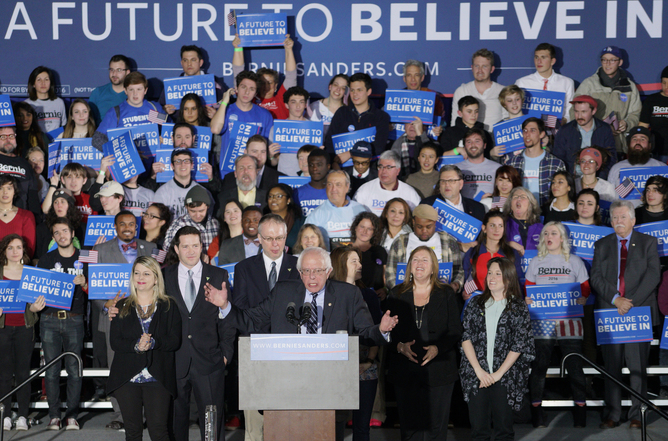
Is this Bernie an eternal flame? Image: Reuters/Rick Wilking
Win or lose, his campaign has captured the imagination of an American electorate that still dreams of a more equal society
Vermont Senator Bernie Sanders has handily beaten Hillary Clinton to win the New Hampshire primary – and after being dismissed as more or less an ideological sideshow when it first began, his campaign has become an unlikely but remarkable movement.
With the Republican Party in a seemingly unstoppable rightward spiral, as the likes of Ted Cruz and Donald Trump dominate its race, the seemingly unexpected rise of as such a proud left-wing candidate as Sanders might seem inconsistent with every trend in recent American politics. At the beginning of the race, he was unknown to many voters outside his home state of Vermont. He is also the Senate’s only self-proclaimed socialist, a label that many once thought would make him utterly unelectable.
But Sanders’s support for “democratic socialism” hasn’t just been surprisingly popular: it’s rapidly changing the way America perceives socialism and all it stands for.
A major strength of Sanders’s campaign is an economic argument against income inequality. This message is at the heart of Sanders’s self-described democratic socialism, but the “revolution” he’s advocating isn’t a Marxist seizure of the means of production; it’s a democratic political uprising.
But this in itself is hardly anything new by the standards of American politics, even at the presidential level.
Right place, right time
Sanders has explicitly placed himself in the tradition of liberal icon Franklin Delano Roosevelt. The comparison is apt indeed: FDR’s liberalism was not only “socialist” by the standards of realigned American politics, providing the foundation for modern liberalism and the foil for modern conservatism. His conservative opponents in the inter-war years labelled him a “socialist” for his bold initiatives to combat the Great Depression and revive the country from economic collapse.
The Sanders-FDR affinity even extends to specific policies. Sanders regularly cites the Glass-Stegall Act and social security, two of the 32nd president’s better-known initiatives, and Sanders frequently references both during debates, town halls, and stump speeches.
By linking himself to FDR, Sanders is betting that the American public will accept his proposals as anything but radical. In fact, the big government solutions he offers to voters are popular with the American public, as is his brand of socialism in general. And yet, this is largely overlooked by his opponents on both sides. Programs such as social security and Medicare have been portrayed as “socialist” by some, yet are both “very important” to many Americans across the political spectrum.
This is all testament to the fact that socialism runs deep in America, and that broadly socialist ideals have proven their appeal many times.
American socialists have been elected and become noted national figures before. Look back to early-20th century Milwaukee, Wisconsin, which elected the first “sewer socialist” mayor in America, Emil Seidel, in 1910. Seidel was also Eugene Debs’s running mate for the Socialist Party in the 1912 US presidential election.
But we need not look a century back to see American socialism in full flower, provided we look in the right place. We could point to the US military – a massive government-owned programme that provides its workers with social benefits for higher education, housing, and specialised, dedicated healthcare.
So various of socialism’s core ideas live on in America’s most visible institutions. And yet, the Democratic Party has backed mostly economically moderate candidates for the past four decades. All the while, Sanders has been articulating this worldview, first as mayor of Burlington, Vermont then from the US House of Representatives and now the US Senate.
So why are he and his brand of out-and-proud socialism suddenly looking so viable? His groundswell of support from younger voters perhaps reflects that more of them view socialism favourably than view it unfavourably. But his success reflects something deeper besides.
A substantial proportion of voters across the political spectrum, and not just younger ones, believe that the status quo is not working for them and that government needs to do more to remedy this – including by redistributing wealth via taxes.
America is primed to find Sanders’s call for “political revolution” appealing. His economic argument offers a chance for actual change, not just hope. His call for bold action to make government work for the middle class, rather than against it, appeals to many struggling Americans, and while his brand of socialism truly marks him as an “FDR liberal”, that isn’t the warning label it might have been before the 2008 financial crisis.
It remains to be seen if he will garner enough support to overcome first Hillary Clinton, then the conservative GOP presidential candidate – but win or lose, it is clear that his campaign has captured the imagination of an American electorate that still dreams of a more equal society.